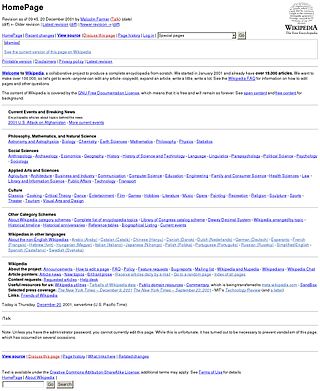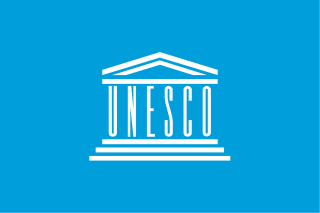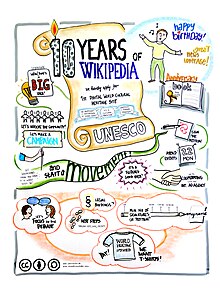
Wikipedia, a free-content online encyclopedia written and maintained by a community of volunteers known as Wikipedians, began with its first edit on 15 January 2001, two days after the domain was registered. It grew out of Nupedia, a more structured free encyclopedia, as a way to allow easier and faster drafting of articles and translations.

A World Heritage Site is a landmark or area with legal protection by an international convention administered by the UNESCO. World Heritage Sites are designated by UNESCO for having cultural, historical, scientific or other forms of significance. The sites are judged to contain "cultural and natural heritage around the world considered to be of outstanding value to humanity".

Wiktionary is a multilingual, web-based project to create a free content dictionary of terms in all natural languages and in a number of artificial languages. These entries may contain definitions, images for illustration, pronunciations, etymologies, inflections, usage examples, quotations, related terms, and translations of terms into other languages, among other features. It is collaboratively edited via a wiki. Its name is a portmanteau of the words wiki and dictionary. It is available in 192 languages and in Simple English. Like its sister project Wikipedia, Wiktionary is run by the Wikimedia Foundation, and is written collaboratively by volunteers, dubbed "Wiktionarians". Its wiki software, MediaWiki, allows almost anyone with access to the website to create and edit entries.

Cultural diversity is the quality of diverse or different cultures, as opposed to monoculture. It has a variety of meanings in different contexts, sometimes applying to cultural products like art works in museums or entertainment available online, and sometimes applying to the variety of human cultures or traditions in a specific region, or in the world as a whole. It can also refer to the inclusion of different cultural perspectives in an organization or society.

The English Wikipedia is the primary English-language edition of Wikipedia, an online encyclopedia. It was created by Jimmy Wales and Larry Sanger on January 15, 2001, as Wikipedia's first edition.

Cultural landscape is a term used in the fields of geography, ecology, and heritage studies, to describe a symbiosis of human activity and environment. As defined by the World Heritage Committee, it is the "cultural properties [that] represent the combined works of nature and of man" and falls into three main categories:
- "a landscape designed and created intentionally by man"
- an "organically evolved landscape" which may be a "relict landscape" or a "continuing landscape"
- an "associative cultural landscape" which may be valued because of the "religious, artistic or cultural associations of the natural element."

Cultural heritage is the heritage of tangible and intangible heritage assets of a group or society that is inherited from past generations. Not all heritages of past generations are "heritage"; rather, heritage is a product of selection by society.

The Wikimedia movement is the global community of contributors to the Wikimedia projects, including Wikipedia. This community directly builds and administers these projects with the commitment of achieving this using open standards and software.

The Dolmen of Menga is a megalithic burial mound called a tumulus, a long barrow form of dolmen, dating from 3750–3650 BCE approximately. It is near Antequera, Málaga, Spain.

The World Heritage Committee is a committee of the United Nations Educational, Scientific and Cultural Organization that selects the sites to be listed as UNESCO World Heritage Sites, including the World Heritage List and the List of World Heritage in Danger, defines the use of the World Heritage Fund and allocates financial assistance upon requests from States Parties. It comprises representatives from 21 state parties that are elected by the General Assembly of States Parties for a four-year term. These parties vote on decisions and proposals related to the World Heritage Convention and World Heritage List.

The World Heritage Convention, formally the Convention Concerning the Protection of the World Cultural and Natural Heritage, is an international treaty signed on 23 November 1972, which created the World Heritage Sites, with the primary goals of nature conservation and the preservation of cultural properties. The convention, a signed document of international agreement, guides the work of the World Heritage Committee. It was developed over a seven-year period (1965–1972).

The Wikimedia Foundation, Inc., abbreviated WMF, is an American 501(c)(3) nonprofit organization headquartered in San Francisco, California, and registered there as a charitable foundation. It is best known as the host of Wikipedia, the seventh most visited website in the world. However, the foundation also hosts 14 other related content projects. It also supports the development of MediaWiki, the wiki software that underpins them all.

The United Nations Educational, Scientific and Cultural Organization (UNESCO) is a specialized agency of the United Nations (UN) with the aim of promoting world peace and security through international cooperation in education, arts, sciences and culture. It has 194 member states and 12 associate members, as well as partners in the non-governmental, intergovernmental and private sector. Headquartered in Paris, France, UNESCO has 53 regional field offices and 199 national commissions.

World Heritage Memory Net (WHMNet), a partnership project with UNESCO World Heritage Centre, is a global digital library of cultural, historical, and heritage multimedia collections related to the current 962 UNESCO World Heritage Sites of 157 State Parties. Of these 962 sites, 745 are cultural sites, 188 natural, and 29 mixed and 38 of the total 962 are in danger. WHMNet was officially launched April 29, 2011, and can be thought of as “the world’s heritage at your fingertips.”

The Wikipedia community, collectively and individually known as Wikipedians, is an online community of volunteers who create and maintain Wikipedia, an online encyclopedia. Since August 2012, the word "Wikipedian" has been an Oxford Dictionary entry.

An edit-a-thon is an event where some editors of online communities such as Wikipedia, OpenStreetMap, and LocalWiki edit and improve a specific topic or type of content. The events typically include basic editing training for new editors and may be combined with a more general social meetup. The word is a portmanteau of "edit" and "marathon". An edit-a-thon can either be "in-person" or online or a blended version of both. If it is not in-person, it is usually called a "virtual edit-a-thon" or "online edit-a-thon".
Biosphere reserves are areas comprising terrestrial, marine and coastal ecosystems. The biosphere reserve title is handed over by UNESCO. Each reserve promotes solutions reconciling the conservation of biodiversity with its sustainable use. Biosphere reserves are 'Science for Sustainability support sites' – special places for testing interdisciplinary approaches to understanding and managing changes and interactions between social and ecological systems, including conflict prevention and management of biodiversity. Biosphere reserves are nominated by national governments and remain under the sovereign jurisdiction of the states where they are located. Their status is internationally recognized.
















